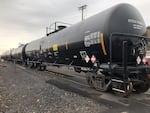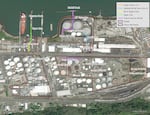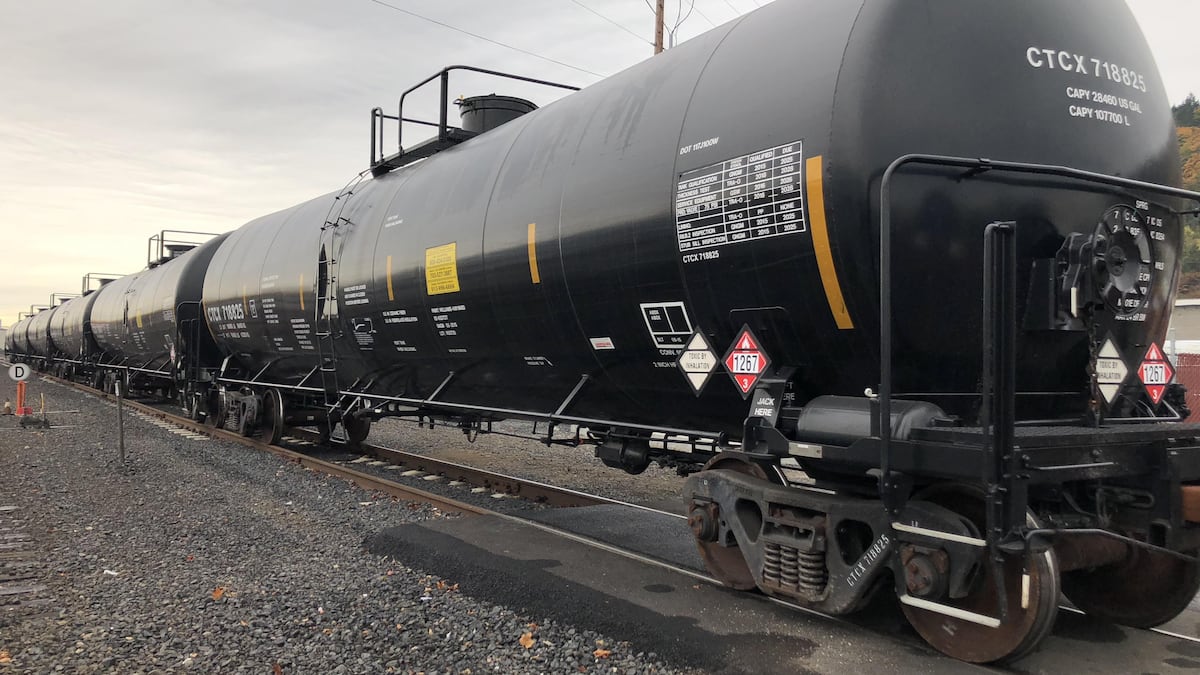The Zenith Energy fuel terminal can continue operating in Northwest Portland after state regulators issued an air quality permit Thursday.
Environmental groups have spent years trying to stop Zenith from shipping and storing fuel within the city’s industrial district along the Willamette River.
Zenith’s terminal hinged on getting an air quality permit from the Oregon Department of Environmental Quality. After years of back-and-forth with city politicians and state regulators, Zenith now has the permit it needs to continue operating in Portland’s critical energy infrastructure hub.
“We appreciate the thoughtful and thorough process DEQ led in consideration of our permit application,” said Grady Reamer, chief commercial officer of Zenith Energy, said in a statement, adding that the company will now focus on phasing out its crude oil operations.

Trains containing petroleum crude oil on a rail line outside of Zenith Terminals, sandwiched between the Willamette River and Forest Park in Portland’s northwest industrial district.
Tony Schick / OPB
The 172-page air quality permit establishes emissions limits for pollutants like volatile organic compounds and mandates regular monitoring. It also requires Zenith to phase out crude oil by 2027. After that, Zenith will focus on renewable fuels, including naphtha, diesel and jet fuel.
Many Zenith critics have raised concerns about the terminal’s location within Portland’s critical energy infrastructure hub, a 6-mile stretch of industrial facilities that’s expected to release toxic chemicals and kill thousands of people in the event of a predicted 9.0 magnitude Cascadia earthquake.
The hub includes 11 fossil fuel terminals and houses about 90% of the gasoline, diesel and jet fuel used in Oregon and Southwest Washington. Critics argue that allowing another fuel terminal to operate in that area will only make it more deadly.
Zenith purchased its 42-acre lot in 2014 and started shipping and storing fuel under an emissions permit that came with the property when it was an asphalt refinery.

A map depicting tax lots where Zenith Energy owns or operates equipment in Northwest Portland.
Image courtesy of the Oregon Department of Environmental Quality
Zenith staff tried to renew that same permit in 2021, but DEQ staff noted that the lot’s operations had changed significantly, from manufacturing asphalt to storing and distributing fuel. Zenith needed to get an entirely new air quality permit, and it also needed to get a land-use statement reflecting that change from the city of Portland.
Since then, environmental groups and nearby residents have called on state and city officials to block Zenith’s operations, pointing to multiple examples of the company violating local regulations.
“It’s outrageous, but not surprising, that DEQ failed to protect our communities from a notoriously dishonest company’s plan to increase air pollution in Portland,” Kate Murphy, community organizer with Columbia Riverkeeper, said in a statement.
In the air quality permit, which expires in October 2030, DEQ outlines how Zenith will comply with environmental regulations by reporting emissions data to the U.S. Environmental Protection Agency.
The EPA is dropping much of its regulatory work during the Trump administration’s push to shrink the government. It’s unclear how that may affect monitoring emissions around Zenith or other fuel terminals in Portland.
